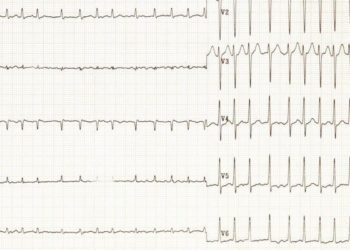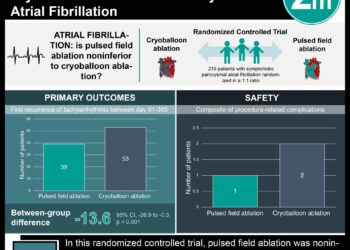The ROCKET AF: Rivaroxaban in atrial fibrillation [Classics Series]
1. Rivaroxaban is non-inferior to warfarin in preventing strokes and systemic embolism.
2. Although there is no significant difference between the two in the incidence of clinically relevant bleeding, rivaroxaban is associated with significantly lower rates of critical, fatal, and intracranial bleeding.
Original Date of Publication: September 8, 2011
Study Rundown: Warfarin has long been considered the standard for anticoagulation in patients with atrial fibrillation to prevent thromboembolic events. The trouble with warfarin, however, lies in its challenging pharmacokinetics, extensive food and drug interactions, and need for INR monitoring. In recent years, however, new oral anticoagulants have been introduced and studied for use in the context of atrial fibrillation. A main advantage of these agents is that they do not require frequent INR monitoring. Dabigatran, a direct thrombin inhibitor, was shown to be a possible alternative to warfarin in the RELY trial, as it was shown to be non-inferior to warfarin in preventing strokes.
Rivaroxaban is another new oral anticoagulant. It acts to prevent thrombus formation by being a direct factor Xa inhibitor. The Rivaroxaban Once Daily Oral Direct Factor Xa Inhibition Compared with Vitamin K Antagonism for Prevention of Stroke and Embolism Trial in Atrial Fibrillation (ROCKET AF) was published in 2011. In summary, rivaroxaban was shown to be non-inferior to warfarin in preventing stroke and systemic embolism (HR 0.88; 95%CI 0.74-1.03). The use of rivaroxaban was also associated with significantly lower rates of critical bleeding, fatal bleeding, and intracranial hemorrhage when compared to warfarin. In patients with non-valvular atrial fibrillation who are at elevated risk of stroke or systemic embolism, rivaroxaban can be considered as an alternative to warfarin in those patients with a creatinine clearance >30mL/min.
Click to read the study in NEJM
In-Depth [randomized, controlled study]: This large, randomized, controlled trial included 14,264 patients from 1,178 clinical centers in 45 countries. Patients were included if they had nonvalvular atrial fibrillation, demonstrated on electrocardiography, and were at moderate-to-high risk for stroke (i.e., CHADS2 score ≥2). Patients were randomized to 2 groups: 1) rivaroxaban 20 mg daily, or 15 mg daily if creatinine clearance was 30-49 mL/min or 2) warfarin with dose titrated to INR of 2.0-3.0. The primary outcome studied was a composite of stroke (i.e., both ischemic and hemorrhagic) and systemic embolism. The primary safety outcome was a composite of major and non-major bleeding events that were clinically relevant.
In the intention-to-treat population, there was no significant difference in the incidence of the primary endpoint between the rivaroxaban and warfarin groups, thereby demonstrating non-inferiority (HR 0.88; 95%CI 0.74-1.03). With regards to the primary safety endpoint, there was no significant difference between the two groups in terms of the incidence of major and non-major bleeding events that were clinically relevant (HR 1.03; 95%CI 0.96-1.11). A further analysis of major bleeding events, however, demonstrated that the rivaroxaban group experienced significantly lower rates of critical bleeding (HR 0.69; 95%CI 0.53-0.91), fatal bleeding (HR 0.50; 95%CI 0.31-0.79), and intracranial hemorrhage (HR 0.67; 95%CI 0.47-0.93) compared to the warfarin group.
Image: PD
©2012-2014 2minutemedicine.com. All rights reserved. No works may be reproduced without expressed written consent from 2minutemedicine.com. Disclaimer: We present factual information directly from peer reviewed medical journals. No post should be construed as medical advice and is not intended as such by the authors, editors, staff or by 2minutemedicine.com. PLEASE SEE A HEALTHCARE PROVIDER IN YOUR AREA IF YOU SEEK MEDICAL ADVICE OF ANY SORT.



